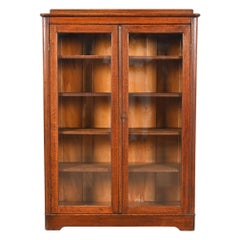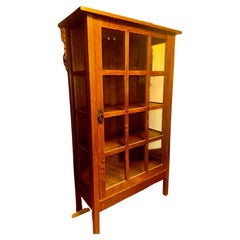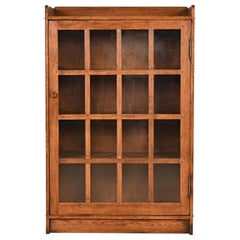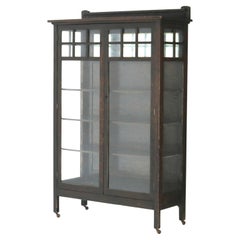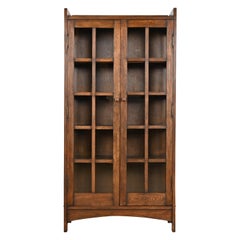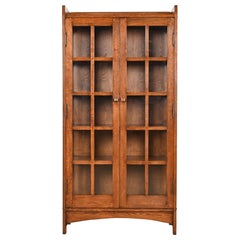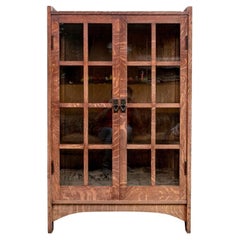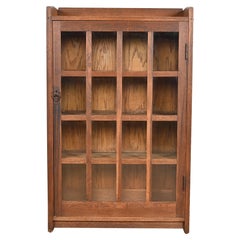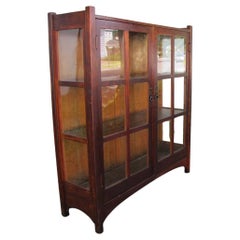Stickley Glass Cabinet
Antique Early 1900s American Arts and Crafts Bookcases
Glass, Oak
Early 20th Century American Arts and Crafts Cabinets
Bronze
Late 20th Century American Arts and Crafts Bookcases
Glass, Oak
Early 20th Century Arts and Crafts Cabinets
Oak, Glass
Late 20th Century American Arts and Crafts Bookcases
Glass, Oak
Late 20th Century American Arts and Crafts Bookcases
Glass, Oak
Late 20th Century American Arts and Crafts Bookcases
Glass, Oak
Early 20th Century American Arts and Crafts Bookcases
Copper
Early 20th Century American Arts and Crafts Cabinets
Glass, Oak
Early 20th Century American Arts and Crafts Bookcases
Glass, Oak
Mid-20th Century American Mid-Century Modern Desks
Brass
Early 20th Century American Arts and Crafts Cabinets
Glass, Oak
Early 20th Century American Arts and Crafts Cabinets
Glass, Oak
Antique Early 1900s American Victorian Bookcases
Glass, Oak
Vintage 1910s American Arts and Crafts Bookcases
Glass, Oak
Vintage 1910s American Arts and Crafts Bookcases
Glass, Oak
Early 20th Century American Arts and Crafts Bookcases
Glass, Mahogany
Early 20th Century American Arts and Crafts Cabinets
Brass
Antique Early 1900s American Arts and Crafts Bookcases
Wrought Iron
Vintage 1910s American Arts and Crafts Dressers
Brass
Early 20th Century American Arts and Crafts Bookcases
Brass
Early 20th Century American Arts and Crafts Cabinets
Glass, Wood, Oak
Antique Early 1900s American Arts and Crafts Secretaires
Glass, Oak
Vintage 1920s American Arts and Crafts Bookcases
Glass, Oak
Early 20th Century American Arts and Crafts Bookcases
Copper
Early 20th Century American Arts and Crafts Cabinets
Ceramic, Glass, Oak
Early 20th Century American Arts and Crafts Cabinets
Oak, Glass
Early 20th Century American Arts and Crafts Bookcases
Glass, Mahogany
Early 20th Century American Arts and Crafts Bookcases
Oak
Vintage 1920s English Mission Bookcases
Brass
20th Century American Hollywood Regency Bookcases
Smoked Glass, Wood
20th Century Arts and Crafts Bookcases
Oak, Glass
Early 20th Century Arts and Crafts Bookcases
Glass, Oak
Vintage 1910s American Arts and Crafts Bookcases
Iron
Early 20th Century American Arts and Crafts Bookcases
Glass, Oak
Antique Early 1900s American Arts and Crafts Bookcases
Glass, Oak
Early 20th Century American Arts and Crafts Bookcases
Glass, Oak
Antique Early 1900s American Mission Cabinets
Iron
Early 20th Century American Arts and Crafts Bookcases
Glass, Oak
Early 20th Century American Mission Cabinets
Glass, Oak, Mirror
Early 20th Century American Arts and Crafts Cabinets
Glass, Oak
Early 20th Century North American Arts and Crafts Cabinets
Glass, Oak
Early 20th Century American Arts and Crafts Cabinets
Glass, Wood, Oak
Early 20th Century American Arts and Crafts Cabinets
Glass, Oak
Early 20th Century American Arts and Crafts Bookcases
Glass, Oak
Late 20th Century American Arts and Crafts Bookcases
Glass, Cherry
21st Century and Contemporary American Arts and Crafts Cabinets
Glass, Oak
Early 20th Century American Arts and Crafts Bookcases
Glass, Oak
Late 20th Century American Arts and Crafts Bookcases
Copper
Early 20th Century American Arts and Crafts Bookcases
Glass, Oak
Early 20th Century American Arts and Crafts Bookcases
Glass, Oak
Early 20th Century American Arts and Crafts Bookcases
Glass, Oak
Early 20th Century American Arts and Crafts Sideboards
Oak, Glass
Early 20th Century American Arts and Crafts Bookcases
Brass
20th Century American Arts and Crafts Bookcases
Glass, Oak
Early 20th Century American Arts and Crafts Bookcases
Glass, Oak
20th Century American Arts and Crafts Sideboards
Lead
Vintage 1980s American Georgian Bookcases
Brass
Late 20th Century American Arts and Crafts Corner Cupboards
Copper
Late 20th Century American Georgian Bookcases
Brass
- 1
Stickley Glass Cabinet For Sale on 1stDibs
How Much is a Stickley Glass Cabinet?
A Close Look at Arts-and-crafts Furniture
Emerging in reaction to industrialization and mass production, the Arts and Crafts movement celebrated handcrafted design as a part of daily life. The history of Arts and Crafts furniture has roots in 1860s England with an emphasis on natural motifs and simple flourishes like mosaics and carvings. This work is characterized by plain construction that showcases the hand of the artisan.
The earliest American Arts and Crafts furniture dates back to the start of the 20th century. Designers working in this style in the United States initially looked to ideas put forth by The Craftsman, a magazine published by Wisconsin native Gustav Stickley, a furniture maker and founder of the Craftsman style. Stickley’s furniture was practical and largely free of ornament. His Craftsman style drew on French Art Nouveau as well as the work he encountered on his travels in England. There, the leading designers of the Arts and Crafts movement included William Morris, who revived historical techniques such as embroidery and printed fabrics in his furnishings, and Charles Voysey, whose minimal approach was in contrast to the ornamentation favored in the Victorian era.
American Arts and Crafts work would come to involve a range of influences unified by an elevation of traditional craftsmanship. The furniture was often built from sturdy woods like oak and mahogany while featuring details such as inlaid metal, tooled leather and ceramic tiles. The style in the United States was led by Stickley, whose clean-lined chairs and benches showcased the grain of the wood, and furniture maker Charles Rohlfs, who was informed by international influences like East Asian and French Art Nouveau design.
Hubs in America included several utopian communities such as Rose Valley in Pennsylvania and the Byrdcliffe Arts and Crafts Colony in New York, where craftspeople made furniture that prioritized function over any decoration. Their work would influence designers and architects including Frank Lloyd Wright, who built some of the most elegant and iconic structures in the United States and likewise embraced a thoughtful use of materials in his furniture.
Find antique Arts and Crafts chairs, tables, cabinets and other authentic period furniture on 1stDibs.
Finding the Right Storage-case-pieces for You
Of all the vintage storage cabinets and antique case pieces that have become popular in modern interiors over the years, dressers, credenzas and cabinets have long been home staples, perfect for routine storage or protection of personal items.
In the mid-19th century, cabinetmakers would mimic styles originating in the Louis XIV, Louis XV and Louis XVI eras for their dressers, bookshelves and other structures, and, later, simpler, streamlined wood designs allowed these “case pieces” or “case goods” — any furnishing that is unupholstered and has some semblance of a storage component — to blend into the background of any interior.
Mid-century modern furniture enthusiasts will cite the tall modular wall units crafted in teak and other sought-after woods of the era by the likes of George Nelson, Poul Cadovius and Finn Juhl. For these highly customizable furnishings, designers of the day delivered an alternative to big, heavy bookcases by considering the use of space — and, in particular, walls — in new and innovative ways. Mid-century modern credenzas, which, long and low, evolved from tables that were built as early as the 14th century in Italy, typically have no legs or very short legs and have grown in popularity as an alluring storage option over time.
Although the name immediately invokes images of clothing, dressers were initially created in Europe for a much different purpose. This furnishing was initially a flat-surfaced, low-profile side table equipped with a few drawers — a common fixture used to dress and prepare meats in English kitchens throughout the Tudor period. The drawers served as perfect utensil storage. It wasn’t until the design made its way to North America that it became enlarged and equipped with enough space to hold clothing and cosmetics. The very history of case pieces is a testament to their versatility and well-earned place in any room.
In the spirit of positioning your case goods center stage, decluttering can now be design-minded.
A contemporary case piece with open shelving and painted wood details can prove functional as a storage unit as easily as it can a room divider. Alternatively, apothecary cabinets are charming case goods similar in size to early dressers or commodes but with uniquely sized shelving and (often numerous) drawers.
Whether you’re seeking a playful sideboard that features colored glass and metal details, an antique Italian hand-carved storage cabinet or a glass-door vitrine to store and show off your collectibles, there are options for you on 1stDibs.
- What is a glass cabinet called?1 Answer1stDibs ExpertSeptember 28, 2021A glass cabinet may simply be called a glass cabinet because its name is likely referring to a cabinet or other case piece that features transparent glass panes on the doors. The glass will offer clear views of items inside cabinets. Find glass cabinets and other case piece furniture today on 1stDibs.
- 1stDibs ExpertApril 5, 2022A curio cabinet is a type of cabinet with glass doors on it. The purpose of a curio cabinet is to display all your curiosities, such as porcelain figures or your favorite china collection. On 1stDibs, find vintage and antique curio cabinets from top sellers around the world.
- 1stDibs ExpertApril 5, 2022It depends, some cabinets have glass installed within them or are customizable to fit glass panels into their doors. Glass cabinets are a great way to proudly display collectible sculptures, rare books or decorative objects, and these furnishings add an open look to any room of your home. Shop a wide collection of cabinets, with and without glass on 1stDibs.
